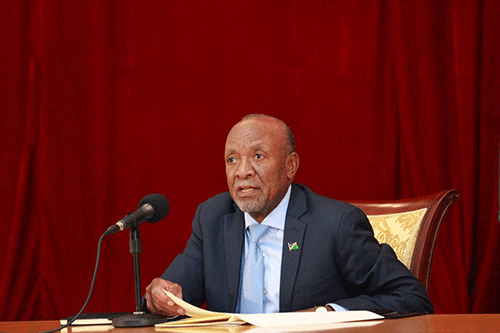“The slowest cow will eventually reach the kraal, so we will get there with vaccinating the larger population.”
These were the words of health minister Kalumbi Shangula yesterday, who boldly declared that the country would eventually reach its target, despite lingering vaccine resistance. As Namibia’s vaccination programme against Covid-19 approaches one year, the country has so far only fully vaccinated 20% of eligible persons.
Namibia’s figure is a far cry from its neighbour Botswana, who has over 1.1 million fully vaccinated people as of yesterday.
Shangula said at the 40th Covid-19 briefing in the capital that fully vaccinated Namibians, permanent residence permit holders, diplomats or people with diplomatic passports, officers on missions and their families, domiciles and their children, truck drivers, ambulance services are exempted from providing a negative Covid-19 test result at ports of entry.
“Persons providing specialised and technical public health services will no longer be required to present a negative Covid-19 PCR test result upon entry into Namibia. The above-mentioned categories of people can enter the country at any time with a valid and authentic vaccination card,” he stated.
He added: “Fully-vaccinated non-Namibians living within a 60km radius of Namibian borders will be allowed into Namibia without having to present negative Covid-19 PCR results. Such persons should present a police declaration from their home country confirming the place of residence.”
From March 2021 until 13 February 2022, the cumulative number of people vaccinated with the first dose of the Covid-19 vaccine for both adults and children is 432 976, of whom 367 485 are fully vaccinated, translating to 20.7% of the total target population (1 779 271).
Deputy information minister Emma Theofelus said the government and the private sector have introduced incentives and measures to ensure the vaccination rate increased.
“The issue of door-to-door vaccination is being considered, but you must understand they are labour- intensive and have a high cost related to them. All these scenarios are being weighed up by Cabinet to make the final decision,” she stated.
Fresh fish, juicy burgers, tablets, money and free data have been some of the many incentives introduced by government and private institutions to entice their employees to get vaccinated. The gifts are reinforcement and motivation for the country to reach herd immunity, which appears to be a whimsical goal due to the small number of vaccinations being administered.
Theofelus said vaccine hesitancy is the driving force around the numbers, which are perpetuated by false information around the vaccines, adding that it is important for media to assist in dispelling such information.
“Communities are continuously being bombarded with information, even beyond our borders. The government is considering avenues to increase vaccine uptake, in addition to some of the measures taken. It still rests with the Namibian citizen to get the right information and make an informed decision on when to get vaccinated and with what vaccine,” she continued.
The government yesterday introduced new measures, which include the increase of the number of people allowed per gathering.
“As we officially pronounce the end of the fourth wave, we find it prudent to adjust the number of attendees at public gatherings from 200 to 500 persons per event,” said Shangula.
He added that physical distancing should still apply and depending on the size of the venue, the number of attendees should be adjusted accordingly to comply with the minimum requirement of physical distancing.
The duration of the new public health measures will be from tomorrow 16 February 2022 to 15 March 2022, and remain amenable to further adjustments should the situation change for the worse, which is being anticipated at this stage.
Shangula gave an assurance about the continuous monitoring of clinically significant mutations of the severe acute respiratory syndrome of Covid-19 through the Whole Genome Sequencing and Real-Time 6 Polymerase Chain Reaction.
“The Omicron variant remains the dominant variant circulating in Namibia. The latest monitoring results revealed that among the samples tested, the Omicron variant makes up 97%, while the Delta variant makes up the remaining 3%. The Omicron sub-lineage BA.2, which was detected in South Africa recently, has not been detected in Namibia,” said Shangula.
Vice President (VP) Nangolo Mbumba, for his part, stated that the last 30-day observance period has offered Namibia and communities some respite as the country is now in the latent stage of the fourth wave, with cases declining.
“The government continues to observe, with concern, the public apprehension and hesitancy on the safety of Covid-19 vaccines. The Namibian government will not do anything to compromise the health of our people,” he added.
The VP, who was vaccinated last year, said the responsibility remains upon every citizen to maintain hand hygiene by washing and sanitising them, to wear a face mask in public, and to maintain appropriate social and physical distancing.
“I once again appeal to all eligible Namibians to receive their vaccination and/or booster shots. These are the most secure preventative measures against the spread, severe illness, hospitalisation and death from Covid-19,” appealed Mbumba, who survived Covid-19 last year.


